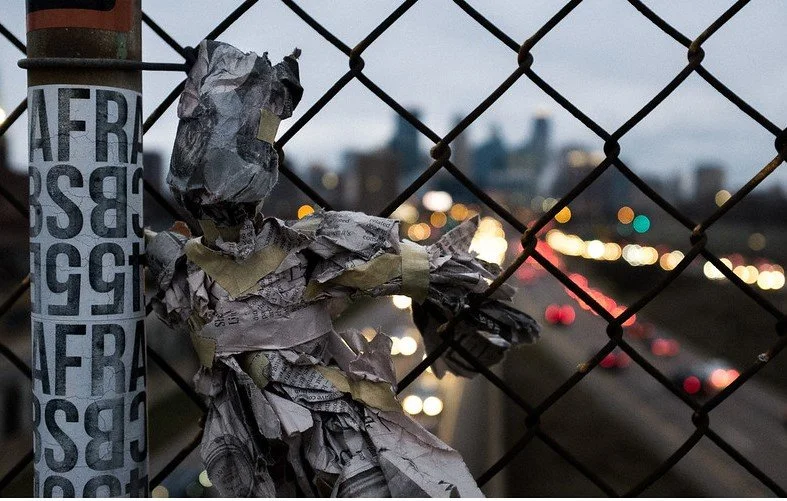Does Sending Police to People in Mental Health Crisis Violate Disability Rights Laws?
Image credit: Bridge Puppets 1 by Theo Goodell
Alt text: Newspaper and tape puppet figure against a chain-link fence with blurred highway lights in the background
Justin Baraga’s mother wanted someone to help him. She asked for medical help; police came. The police grabbed him, strapped him to a gurney, and forcibly took him to the hospital, which released him without treatment. He was never charged with any crime. A recently filed lawsuit explains that this is New York City’s standard procedure—police are required to force “Emotional Disturbed Persons” (EDPs) to go to a hospital for psychiatric evaluation.
Seeking Help, Getting Harm
In the case, Baraga v. City of New York, Justin and three other plaintiffs, as well as several nonprofit groups, challenge the policy as illegal disability discrimination, violating the ADA and other civil rights. Detaining someone who has committed no crime against their will is, after all, a drastic measure. The lawsuit alleges that New York does it simply because someone—almost anyone—has applied the label “emotionally disturbed.” For Steven Greene, another plaintiff in the case, it was an unidentified “social worker” who called 911 in the middle of the night—he suspects actually a disgruntled ex-girlfriend. The police apparently did not check her credentials or even name before they hauled Steven off in handcuffs.
Sarah Arvio was on the phone with a staff member at the liver medicine clinic, trying unsuccessfully to get her hepatologist to fill out a disability form. It was frustrating, and she said “I’m so frustrated with you that I feel like jumping off a bridge.” The staff sent police to her door. When she understandably said she did not want to go to the hospital, the police handcuffed her, choked her until she passed out, and dragged her out. She ended up with a bleeding, infected leg and bruises all over her body.
Sarah, Justin and the other accounts in the 72-page complaint seem all too familiar to me from talking with clients who have tried to get help in a mental health crisis and ended up hurt and traumatized. Several cities have implemented alternative mental health crisis response programs, particularly in light of the increased attention to police reforms in 2020.
New York has not followed suit, and its inaction hurts people and communities of color most, according to the Baraga complaint.
The Need for Community and Peers
New York City announced an alternative mental health crisis response program with much fanfare, but the tiny pilot is restricted to a small part of Harlem and says it responded to a total of 564 calls in six months. New York’s 911 system receives 500 mental health calls a day. To compare, the frequently cited model CAHOOTS, in Eugene, Oregon, fielded 24,000 calls in a year.
There are questions about whether New York City’s current pilot model is effective even for the few people it serves. It relies on paramedics and social workers instead of community members and peers. The Federal Substance Abuse and Mental Health Service Administration (SAMSHA) emphasizes the need for teams to include and make significant use of “Peers with lived experience similar to the experience of the population served.”
I’d like to think New York City, where I live and work, is better than this. Our communities, our friends in crisis, and perhaps especially our police deserve better. New York should have a world class mental health crisis response system that follows well-established best practices. Let’s hope the city takes this lawsuit as an opportunity to work with advocates and solve this problem for all New Yorkers.
For more than fifteen years, Maia Goodell has been committed to high quality legal work in partnership with people and organizations fighting for equity. She practices at Kakalec Law PLLC, a public interest law firm in New York. Before attending law school, Maia was a Surface Warfare Officer in the U.S. Navy, serving in USS Abraham Lincoln and USS Port Royal. That military experience informs her life and legal practice.
IDHA’s blog is home to diversity of perspectives and opinions about mental health and healing. These posts seek to magnify a wide range of perspectives on different topics. The opinions expressed are the writers’ own.

